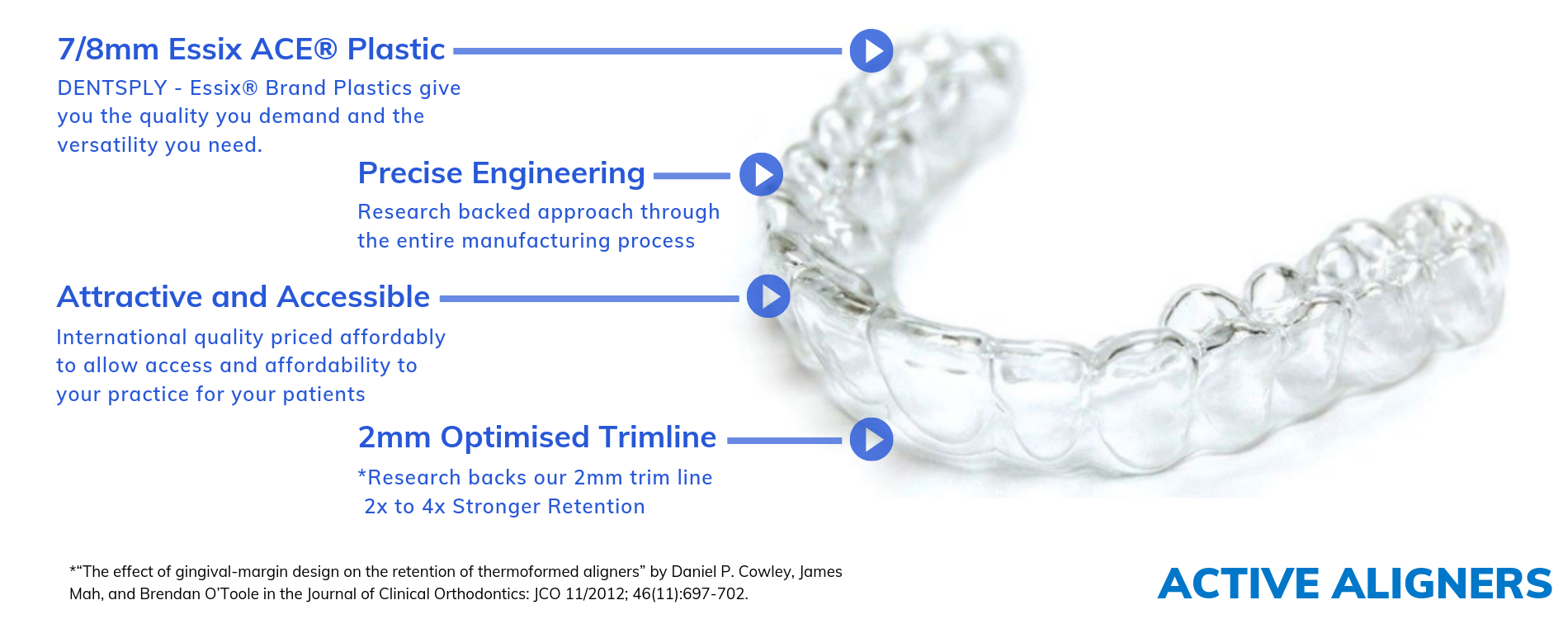The Active Aligner Difference
Accuracy - Support - Philosophy
Accuracy
-
3D Printers specifically calibrated to the lab environment and temperature
Many Labs buy off-the-shelf 3D printers to produce aligners, which, depending on the climate, atmospheric pressure and humidity levels, differ from location to location for 3D printing.
-
4.0 Bar positive pressure thermoforming instead of vacuum forming
Many Labs use Vacuum forming “suck down” machines that don’t have the accuracy required for teeth, gum line definition and gingival textures needed for quality patient outcomes.
-
Intraoral scans or advanced lab scanners with powerful Cad/Cam
Accuracy throughout the Aligner therapy process is critical, poor performing equipment add %’s of error across the process, from record taking through to the manufacturing of aligners. Great Active Aligners start with great impressions.
-
Aligner Material
Appearance, Strength and Durability - which is why we use Essix. “When it comes to meeting the needs of clinician and patient alike, Essix® Brand Plastics give you the quality you demand and the versatility you need.” Dentsply Sirona.

Movement and Movement Philosophy
-
Clear set protocols for Active Aligner therapy
One of the most important factors for patient outcomes are the actual treatment plans that predict your patients tooth movement, our philosophy (In detail in our online course available - here)
- Being least invasive,
- Using maximum arch expansion
- Allowing minimal IPR (interproximal reduction) requirements
- Using of attachments where necessary to ensure predictable movement and outcomes
-
Research backed Active Aligner trim lines for better patient outcomes
A study from the University of Nevada compared the retentive strength of the three trimming techniques. The outcomes based on the techniques are impressive (full study here).
- For clear aligners without attachments, the 2mm cut from the gingival margin was about 2x as retentive as traditionally scalloped.
- For clear aligners with attachments, the 2mm cut from the gingival margin was over 4x as retentive as the scalloped trim.
- Comfortable for patients - with a smooth contour and a 2mm trim line into the gingival margins, less risk of irritating the gingiva and more discreet as the edge of the Active Aligner should be under the patient's lip profile.
-
Treatment planners with substantial aligner therapy experience
With the hype around direct to consumer orthodontics, there is a lot more to tooth movement than straight incisors: correct occlusion, black triangles, smile and facial aesthetics etc. (more in our online course - here).
Direct to consumer orthodontics have some major flaws in patient outcomes as most have limited outcomes as they don't cater for critical dental work that's required for great smile outcomes.
The difference is you the provider - We have ensured you get the best patient outcomes by ensuring your treatment plans come with all the necessary requirements ie: IPR, attachments, retainers, 3D viewing and smile summary.
Support
-
Doctors Help Centre and FAQ Section
We know that information and continuous education is key in the modern world and economy of patient treatment. We are constantly innovating and adding value to you and Active Aligners, it's why we expect our Help Centre and FAQ's section to be constantly growing and be one of the best doctors resources available for aligner therapy.
-
Workflow and submission assistance
We understand that you have dozens of different treatments and procedures to perform every week and that it's almost impossible to remember every step needed for each one. It's why we value support so highly - our team knows help is important when you need it, we are here to help 24/7
-
Quick turn-around times
In the modern digital economy, time means a lot, it could quite be the most valuable thing we don't have a lot of. Priding ourselves on efficiencies through the entire supply chain is critical in making sure you get quick turn around times from treatment planning, a patient needing a replacement aligner through to delivery of full Active Aligner cases.

